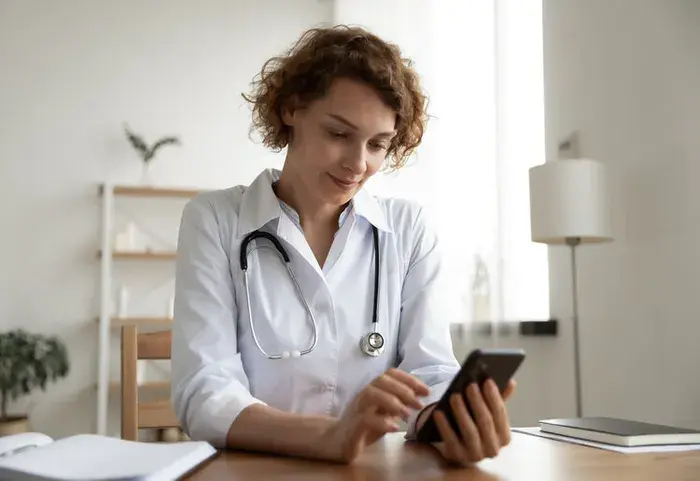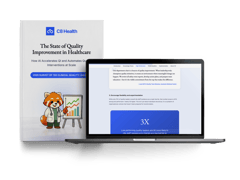
Mobile Technology in Healthcare: The Future of Team Collaboration
Healthcare providers are always on the go, so we need to be able to carry our workstations in our pockets. Mobile health (mHealth) and mobile technology may be the most relevant technology that we have in healthcare.
With the global mobile health market projected to reach $189 billion by 2025 and the healthcare industry undergoing digital transformation, integrating mobile health (mHealth) technology in your knowledge management strategy is not just about convenience; it's about enhancing efficiency, collaboration, and care coordination. Let's take a look at how.
Meet the Expert
Ido Zamberg M.D. is a board-certified physician (General Internal Medicine and Anesthesia), currently a Fellow at the Division of Experimental Medicine, McGill University Health Center, Montreal, Canada
» Looking for in-pocket healthcare knowledge? Explore the C8 platform for better care coordination.
What Is Mobile Technology in Healthcare?
Mobile healthcare technology is the use of mobile and wireless devices to deliver healthcare services and information.
This includes a range of tools and strategies, including centralized digital information hubs, mobile health apps, wearable devices, and electronic health records (EHRs) accessible on mobile devices.
For instance, in the management of heart attacks, you can send EKG results directly from the field. In some cases, blood tests can also be conducted in the field with results sent directly to the health professional's phone. So, these tools act as a conduit for better information dissemination, timely communication, and efficient coordination, especially for those health professionals who are on-call or in the field.
The Benefits of Mobile Technology in Healthcare
Mobile healthcare technology empowers healthcare providers to deliver better-coordinated care through enhanced team collaboration and unified information access.
With mobile technology, you can:
- Communicate seamlessly with team members through real-time messaging and video conferencing, facilitating faster response times and quicker decision-making.
- Access patient information on the go, including patient records, test results, and treatment plans, ensuring coordinated care and reducing the risk of errors.
- Use AI-powered search to retrieve relevant information within seconds, providing easy access to best practices and guidance.
A powerful mobile knowledge management system serves as a central mobile hub for your entire organization, providing seamless access to locally vetted guidance directly from any mobile device. Our platform was designed to do just this with easy access to information and best practices in mobile-friendly formats.
This real-time access to critical information lets healthcare teams make informed decisions quickly, improving patient care and streamlining workflows.
Our latest case study shows the real-world impact that integrating C8 Health's platform has had on anesthesiology departments across the US. Download it today to learn more.
The Challenges of Mobile Technology in Healthcare
Mobile technology also presents challenges that need to be addressed to ensure that it is used safely and effectively.
- Infection dissemination: Mobile devices can harbor and spread germs, potentially causing infections. To address this, healthcare institutions have implemented strict disinfection protocols for mobile devices after patient interactions.
- HIPAA compliance: The Health Insurance Portability and Accountability Act (HIPAA) safeguards patient health information. Healthcare institutions must establish policies for mobile device usage, such as data encryption and restricted access.
- Overly restrictive security measures: Excessive security measures can hinder the adoption of beneficial mobile technologies. Healthcare providers may be reluctant to use these tools if they are too cumbersome or restrictive.
Healthcare institutions are currently overwhelmed by the rapid advancement of technology. Their initial reaction is often to block new technologies, but a more nuanced approach is needed.
Institutions need to better define what constitutes a risk and what information needs to be secured. This would prevent the blocking of new technologies that could improve patient outcomes and allow for faster integration of these technologies.
» Streamline collaboration with C8 Health's data-driven features.
The Future of Healthcare Collaboration
As mobile technology enhances healthcare collaboration, C8 Health can help you provide connected, efficient, and patient-centric care. Our comprehensive mobile knowledge management platform offers secure access to trusted, vetted guidance, so your healthcare teams can offer coordinated care, make informed decisions, and improve patient outcomes.
We understand that the success of mobile technology in healthcare relies on finding the right balance between security and usability. That's why this platform provides mobile-friendly accessible best practices directly from any internet-connected device.
» Explore more ways to improve staff wellness


